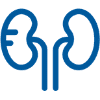You can definitely eat a healthy diet without raising blood potassium levels – the key is moderation. Although some common fruits and vegetables have a higher potassium content, it doesn’t necessarily mean you can “never ever eat them ever again.” There are a wide variety of fruits and vegetables that have a lower potassium content which people can have with less caution. The key is in knowing the foods that have a higher potassium content and limiting/avoiding them. As for grains and nuts, those can also be incorporated into a renal diet, but again with mindfulness. Perhaps you may have heard or read that whole grains and nuts are to be limited/avoided likely because they contain phosphorus. Again, there are traces of phosphorus in all sorts of foods. But that doesn’t mean you can never eat them. Our body’s absorption rate of organically occurring phosphorus is much less when compared to inorganic phosphorus (i.e. additives). Reach out to your renal dietitian to discuss and tailor food options that would be safe for you. That way eating will hopefully not feel as restrictive or overwhelming.
How do you eat a healthy diet without raising your blood potassium? Are grains and nuts great to eat with kidney disease?
Dietitian
Disclaimer
Kidney Kitchen is not designed to diagnose disease or prescribe an eating plan for your stage of kidney disease. The information shared on Kidney Kitchen is developed by experts in renal nutrition and is provided for informational purposes only. The American Kidney Fund, its staff, agents and Trustees are not able to provide medical advice. Please consult with a medical professional or registered dietitian for specific questions you may have about your diet. Learn more












